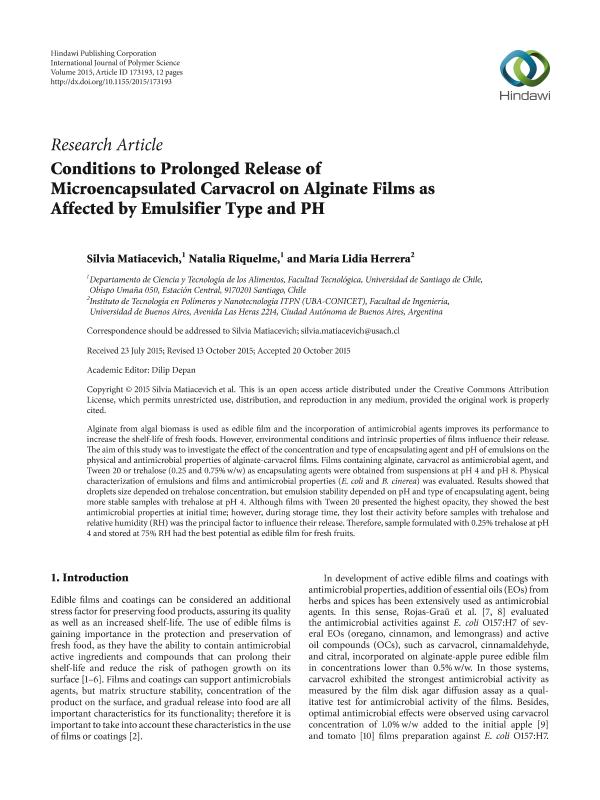Artículo
Conditions to Prolonged Release of Microencapsulated Carvacrol on Alginate Films as Affected by Emulsifier Type and PH
Fecha de publicación:
12/2015
Editorial:
Hindawi Publishing Corporation
Revista:
International Journal of Polymer Science
ISSN:
1687-9422
Idioma:
Inglés
Tipo de recurso:
Artículo publicado
Clasificación temática:
Resumen
Alginate from algal biomass is used as edible film and the incorporation of antimicrobial agents improves its performance toincrease the shelf-life of fresh foods. However, environmental conditions and intrinsic properties of films influence their release.The aim of this study was to investigate the effect of the concentration and type of encapsulating agent and pH of emulsions on thephysical and antimicrobial properties of alginate-carvacrol films. Films containing alginate, carvacrol as antimicrobial agent, andTween 20 or trehalose (0.25 and 0.75% w/w) as encapsulating agents were obtained from suspensions at pH 4 and pH 8. Physicalcharacterization of emulsions and films and antimicrobial properties (E. coli and B. cinerea) was evaluated. Results showed thatdroplets size depended on trehalose concentration, but emulsion stability depended on pH and type of encapsulating agent, beingmore stable samples with trehalose at pH 4. Although films with Tween 20 presented the highest opacity, they showed the bestantimicrobial properties at initial time; however, during storage time, they lost their activity before samples with trehalose andrelative humidity (RH) was the principal factor to influence their release. Therefore, sample formulated with 0.25% trehalose at pH4 and stored at 75% RH had the best potential as edible film for fresh fruits.
Palabras clave:
Alginate Films
,
Carvacrol
,
Control Release
Archivos asociados
Licencia
Identificadores
Colecciones
Articulos(ITPN)
Articulos de INSTITUTO DE TECNOLOGIA EN POLIMEROS Y NANOTECNOLOGIA
Articulos de INSTITUTO DE TECNOLOGIA EN POLIMEROS Y NANOTECNOLOGIA
Articulos(SEDE CENTRAL)
Articulos de SEDE CENTRAL
Articulos de SEDE CENTRAL
Citación
Matiacevich, Silvia Beatriz; Riquelme, Natalia; Herrera, Maria Lidia; Conditions to Prolonged Release of Microencapsulated Carvacrol on Alginate Films as Affected by Emulsifier Type and PH; Hindawi Publishing Corporation; International Journal of Polymer Science; 2015; 12-2015; 173193-173193
Compartir
Altmétricas




